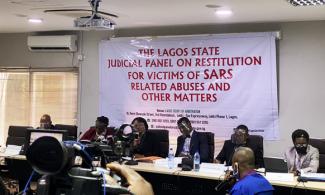
The organisation also condemned the continuous ban of protests across the country by the Nigeria Police Force.
A civil society organisation, the Rule of Law and Accountability Advocacy Centre (RULAAC), has stated that Nigerians are yet to see the government implement the recommendations of the various State Judicial panels of inquiry one year after the nationwide EndSARS protests which exposed police brutality and excesses.
The organisation also condemned the continuous ban of protests across the country by the Nigeria Police Force. RULAAC said despite the various brutalities by security agents during the 2020 EndSARS protest, the government as well as the police were still on the move to stop peaceful protests and gatherings.

It accused the government of moving from denials to partial admission and attempts to cover up the truth regarding the incident of the October, 20, 2020, Lekki Tollgate shooting by officers of the Nigerian Army on peaceful protesters.
RULAAC maintained that the government should enforce various recommendations of the state Judicial Panels of Inquiry looking into cases of all forms of police brutality and extra-judicial killing in each state.
The Executive Director, Okechukwu Nwanguma, stated these in a statement obtained by SaharaReporters.
The organisation said, “It was expected that the EndSARS protests would propel the government to see the need to urgently initiate a comprehensive police reform programme to address the challenges and gaps that allowed the egregious misconducts that triggered the EndSARS protests.
"We recall that barely one month before the commencement of the EndSARS protests across the country, President Buhari had signed into law the new Police Act 2020 which provides a framework to commence genuine and far reaching police reform. From compromised recruitment process, to poor training (including dilapidated training institutions and poor training curriculum) to inadequate funding and poor welfare conditions which make the police work force prone to corruption and violence.
“The new Police Act has elaborate provisions for due process safeguards and how police officers should exercise their powers. We recall also that the IGP and the federal government acceded to the 5-Point Demands presented by the EndSARS protesters and affirmed that the demands were genuine concerns and will be addressed by the Government. The IGP in response to the demands, dissolved the Special Anti-Robbery Squad (SARS), reaffirmed the constitutional rights of Nigerians to peaceful assembly and protests; affirmed the sanctity of life of every Nigerian and the role of the Police in protecting this right. Many State governments set up judicial panels of inquiry.
"However, in spite of these acknowledgments, the federal government, at the same time resorted to vile tactics to suppress the peaceful protests before it eventually deployed naked force to brutally quell the protests by dispatching soldiers to open fire on the assembly of unarmed and peaceful protesters leading to loss of lives and injuries.
"Security agencies commenced crackdown on the leaders and presumed sponsors of the EndSARS protests, arrested and detained some of them, seized the travel documents of some others and freezed the bank accounts of others.
"Police abuses remain widespread with police officers engaging in the same patterns of abuse that sparked EndSARS. The arrest and continued unlawful detention of Gloria Okorie by IRT and the refusal by the police to comply with Court orders to release her, the indictment of the former head of the IGP Intelligence Response Team, DSP Abba Kyari by the FBI for abuse of power and for lending his police authority and position to aid and abet international fraud and benefitting from the proceeds of crime are recent instances that illustrate how police abuse and the failure by police authorities and the government to stamp out impunity have continued one year after the EndSARS protests.
"Nigerians are waiting to see the government implement the recommendations of the various State Judicial panels of inquiry with regard to bringing perpetrators to account. That's one way the state will send a clear message that it will not condone human rights violations. It is one way to stamp out impunity for police abuses.
"The Nigeria Police must commit itself to the professional standards characteristic of Police in a democracy. The police must be the protectors of human rights and the rule of law and not predators and law breakers."